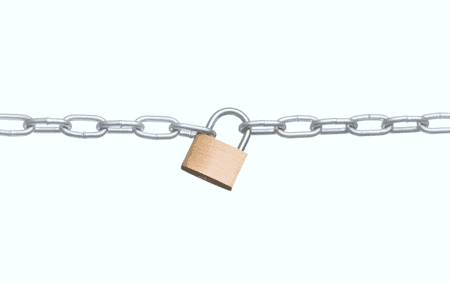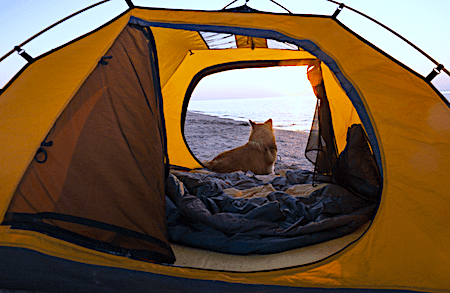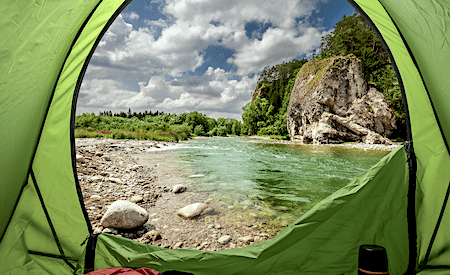Does sleeping in a tent make you feel unsafe or fearful? It’s not just you; countless other campers are wary of sleeping in insecure tents as well.
After all, when out in the wilderness, there’s no telling if you’ll have your belongings stolen by thieves or some wild animal break into your tent.
For this reason, keeping themselves and their valuables safe at night is why many people consider locking their tent from inside an essential step.
Regardless of the security level, it’s an effective way to maintain a sense of safety at your campsite.
So, let’s explore how to lock a tent from inside and get to know a few more tips for keeping your tent, your belongings, and yourself safe and sound in the wilderness.
Is Locking Your Tent Really A Good Idea?
To be honest, a lock is never enough to keep you safe from intruders; it is more of a safety net.
Locking your tent can be beneficial mainly psychologically than physically, such as making you feel safe even if there is no real barrier to prevent anyone (or anything) from getting in.
When someone truly wants to, they can easily access your tent walls and doors. Since no tents are cut-proof, anyone could slash the fabric with a knife and get inside.
But again, as with home security, you might agree that most burglars just want to target the most accessible target possible. 90% of the time, a thief chooses to move on to an easier target if they encounter any hint of resistance.
In a similar sense, tent locks create a barrier that can make your intruder’s penetration somewhat challenging.
They may decide it isn’t worth the effort to get into the tent if it is locked, and they may also believe it will be too difficult and time-consuming, thereby drawing unwanted attention.
In the meantime, you feel at ease because you know your tent is secure.
So, if nothing else, locking your tent may allow you some precious minutes to collect your thoughts, plan your defense, or call for help.
Due to this fact alone, I highly recommend locking your tent whenever you are inside.
Can You Lock A Tent From The Inside?
Why not? You can sure lock the door to your tent with a tent lock if you’re using it from the inside.
Like we’ve mentioned above, the vast majority of thieves and intruders look for easy access, even though they can easily access tent walls and doors.
When they encounter resistance, they may opt for an easier target out of fear of being seen in a busy campsite.
However, it’s nowhere near wise an idea to disclose that you’re using a tent lock without securing the tent beforehand, as this might indicate to thieves that there are valuables inside.
Therefore, it’s better to secure the tent door from the inside rather than the outside since an external lock could lead thieves to believe some valuable items are hiding inside the tent.
How To Lock Your Tent From Inside
You can lock your tent from the inside in two ways, both of which involve securing the tent door’s two zippers together.
Here’s how you can do it.
#1. Locking a Tent Zipper Using Some Laces
The first method involves only a rope or lace to secure your tent from the inside. A string can serve you in several ways, but you need something functional and small when it comes to locking your tent.
In my experience, shoelaces have been helpful on many occasions because they are handy, inexpensive, and easy to remember (so long as you wear shoes!).
To lock your tent’s zippers with a shoelace:
Close The Tent Door
Closing the tent door is the first thing you need to do. Ensure that the door is tightly closed and that the zippers are next to each other.
Your zippers should dangle next to one another if you have secured the door properly.
Thread The Lace Through The Zipper Holes
The next step is to thread the shoelace through the zipper holes. You should have no trouble fitting and sliding the lace through the holes so long as it isn’t overly thick and big.
Tie A Knot
Finally, you should tie a knot to secure the zipper tightly. Instead of tying a standard knot, tie the shoelaces together just like you would while securing your shoes.
Using this technique, you will be able to undo the knot by simply pulling the laces apart. The knot may otherwise take a few minutes to untie.
Who knows, you might have to leave your tent quickly in the event of an emergency.
#2. Securing The Tent Zippers With A Padlock
Alternatively, you can lock the tent door from the inside by securing each zipper together before attaching tent locks at each end.
A retractable cable lock is an excellent choice for this purpose. You could also possibly want to use a regular padlock, but a flexible cable lock is always way more versatile.
To lock your tent’s doors from the inside with a padlock, follow these steps:
Close The Tent Door
Once again, you should begin by closing the doors. Tents usually have an inside zipper, so closing the door and tying it up is much easier.
Make sure to pull both zippers together.
Slide The Lock’s Cable Through The Zipper Holes
The next step is to find the holes while holding the zippers together. Once you locate them, you can thread the padlock cable through each of these holes.
Simply slide in the flexible cable’s open-end through each zipper hole and insert the padlock.
Secure The Lock
Once inserted, secure that open end to the padlock you’ve just inserted by locking them together. By doing so, you will seal the lock and guarantee that it’s, in fact, shut.
The advantage of using a number combination lock over a key padlock is that it’s one less item to lose or forget, which’s why it’s my preferred choice.
The Master Lock 4688D is one such lock that I highly recommend since it can fit through even the narrowest zipper holes.
When using a combination lock, you’ll want to turn one digit at a time only, leaving the rest untouched. That way, when you need to go quickly, all you have to do is turn one number.
Additional Measures You Can Take To Secure Your Tent
Locking tent doors can indeed give you a sense of security about your belongings, but it’s not at all like securing the front door of your house. In reality, locking won’t do much for a tent, as we mentioned earlier.
Therefore, taking a few necessary precautions beforehand is the best way to keep yourself, your tent, and other belongings safe.
Let us share a few practical measures that you can take to keep you and your valuables safe while camping.
#1. Choose The Camping Spot Wisely
Choosing an ideal pitching location is an integral step in preventing break-ins. Consider picking a campsite that doesn’t seem too isolated.
Select a location near where many people walk. Intruders are always interested in isolated campers, so don’t let that be you.
It’s also advisable not to pitch the tent near the main road. In this way, thieves with vehicles will be reluctant to enter the campsite to steal before running away since they won’t want to risk getting stuck.
Also, don’t camp in dense vegetation or close to tons of trees when wild camping. Because with less visibility, it’s more difficult to spot potential intruders.
Make sure the door of your tent faces the safest area.
#2. Camp With People You Know
An excellent way to secure your tent is to go camping with trusted people. You can always count on your campmates to watch over your goods while you’re out exploring.
A good time for this is when you’re camping around a busy area or at a festival. It’s alright to leave your tent with someone, so long as your family or friends are willing to keep an eye on it.
Besides, you’ll want to get to know your camping neighbors when planning on being away from your tent for a while.
#3. Store Your Valuables Someplace Inaccessible
Another possible solution is to keep your valuables hidden in your tent. Ideally, you may want to put them beneath your sleeping bag.
Therefore, if a thief were to peek into your tent, they wouldn’t see anything unusual. If possible, keep your valuables in a lockbox or security compartment inside your tent.
The box reduces the possibility of someone accessing your things; however, if someone breaks into your tent, they can simply grab the box and disappear with all the stuff you kept there.
If you wish to safeguard your valuables more securely, it is best to do so in a safer location, such as in your vehicle.
Yes, there’s no telling burglars won’t break into your car, but they have considerably better security than tents. And vehicles can certainly withstand other threats besides thieves, such as wild animals.
It’s always advisable to leave as many valuables at home as possible if you want to avoid theft entirely. Ideally, you should only carry with you what is truly necessary.
#4. Leave No Valuables Unattended In The Tent
Whenever you go camping, you are sure to be carrying around a backpack. That’s why taking valuables with you along for the trip is best practice, even if it may not always be possible.
When you do this, you might end up with heavier luggage, but at least it will take away your worries about having your valuables stolen.
#5. Install A Tripwire Alarm
Your tent will be much more secure if you install a tripwire alarm. Such alarms are small, portable, lightweight, and inexpensive.
Also, you’ll know right away if anything comes near your campsite, thanks to these alarms, which are usually pretty loud.
Hang one near your tent to keep yourself and your goods safe.
#6. Install A Motion Sensor Lighting
At night, turning on the lights usually makes thieves flee into the shadow of darkness.
So, in addition to locking your tent, you should also consider installing motion-detecting lights that will turn on when someone walks across a beam of light at a certain point near your tent.
This one from Consciot is solar-powered, simply requiring you to stick it in the ground near your tent.
It can light up the area in no time, allowing you to peek out to see what’s causing it to come on – bears, raccoons, thieves, or perhaps one of your campmates running late.
With its low-tech design, you won’t have to stress about cell phone reception.
Simply stake it into the ground, let the sunlight power it, and you have an additional layer of protection alongside your tent padlock.
#7. Free-Standing Tents Are A No-No
Despite the popularity of freestanding tents among hikers and backpackers, they do not provide as much security and safety as non-freestanding tents.
Because they are lightweight, one can easily pick up and move free-standing tents from place to place on the trail as they do not have stakes.
These tents also collapse easily due to slipping trekking poles during the night. Therefore, locking a tent becomes pointless when you have a free-standing tent.
#8. Cover Your Tent Aith A Rainfly
A rainfly serves as a barrier between your tent and the elements. It can help prevent damages to the tent from weather conditions.
Furthermore, it obscures what is inside the tent from view. As a result, it might help reduce the chances of people stealing from you as they can’t see what’s inside.
Final Thoughts
So, that’s that. You now know how to lock tent from inside and how to make sure it’s safe at all times.
Ultimately, locking your tent has more to do with psychological comfort than actual security purposes.
It may not be enough to prevent people from breaking into your tent, but if you lock it, you can dampen their interest and discourage them from doing so.
In the end, it all boils down to how prepared you are and what precautions you take to keep your valuables safe.



